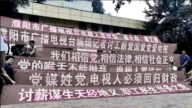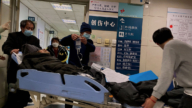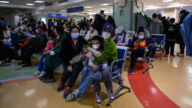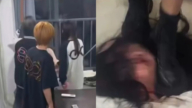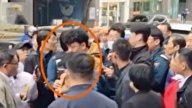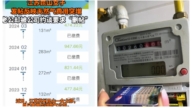【新唐人2013年07月31日訊】在大陸,很多中共號稱「利民」的法規,頒布後卻從來沒有實施過﹔有一些補助類的規定,長達幾十年不變,無論物價如何上漲,那些補助金額依舊。也有一些陳年舊規,制定之初針對的人群已經發生巨大變化,但依然「模糊執行」著,這些規定被民間戲稱為「沉睡的規定」,如「獨生子女費」31年來仍然不變,但「超生費」現在甚至已飆升到百萬。請看下面這則報導。
31年前,中共當局為了讓殘害生命的計劃生育政策能實施下去,發明瞭所謂的「獨生子女費」。按照規定,執行了「一胎制」的夫妻每月補助5到20元。但隨著時間推移,物價成倍的上漲,這5元錢的最低線,卻從來沒有發生過變化。
中國獨生子女母親楊女士:「甚麼都在漲,這些費用根本都不漲, 5塊錢甚麼作用都起不了。現在買一根冰棍要2塊5,我覺得(獨生子女費)應該隨著物價水平上漲。」
儘管民眾要求增加補助獨生子女費,但當局依然置若罔聞。
大陸網民張先生:「幾十年過去了,現在5塊錢已經貶值很多倍了,但是現在還沒有改變,說明老百姓、民眾的權利被漠視,並且(民眾)也沒有渠道去表達,也改變不了。」
與「獨生子女費」相反的是,當局對違反計劃生育的民眾所徵收的懲罰金,也就是「社會撫養費」卻在逐年遞增,從原來的數百、上千,變成現在動輒數萬、數十萬、甚至上百萬元。令很多民眾不堪重負,甚至有人因為無力繳納巨額罰款而走上絕路。
北京時政觀察人士華頗:「現在中共這些部門本身是追求最大利益化,比如說增收的社會撫養費,這筆錢的數目很大,但是至今沒有任何一個賬目能夠反映出來,這筆錢的流向也成謎。所以制定政策都是為自己量身定造的。」
同樣是補助政策,只因面對的群體有了不同,就出現了完全不同的結果。 記者發現,1982年前後,中共各企事業單位和機關的職工工資補貼裡,有兩項補貼,分別是洗理費和書報費,從最初的4元漲到了現在的上百元。
張先生:「機關政府官員,他立這些東西一直在漲,現在他們可以主導自己的權利,就像他們給自己漲工資啊,報銷東西啊、然後所有的福利可以自己決定,中國的現狀就是,老百姓這些納稅錢哪,老百姓根本沒有權力進行監督,沒有權力決定這錢用到哪些方面,只是被中共利益集團一小撮人決定如何分配。」
在中共體制當中,除了那些與社會完全脫節的「沉睡政策」之外,還有一些所謂的「利民」政策,則是停留在紙面上或者有名無實。
例如﹕1960年公布的「防暑降溫法規」,原本是對工業、交通運輸以及建築工地等工作者的津貼,因為他們在夏季高溫或露天中作業。不過,實行53年後,現在已經演變為辦公室裡吹著空調的公務員們,每個月可以領到的上百元「高溫補貼」,而真正揮汗如雨的駕駛員、建築工人、快遞工人等基層打工者,卻從來沒有領到,甚至沒有聽說過這項所謂的「防暑降溫補貼」。
中國金融智庫研究員鞏勝利:「其實這幾乎是中國的慣例,法制社會在倒退。中國所有利於百姓的規定,都是空空的擺設。」
此外,頒佈於1981年的「職工探親假規定」,當時針對的人群是「國家機關、國有企業以及事業單位」的職工,但隨著國企以每年近5萬家的速度大面積破產,「探親假」變成了公職人員的「福利」,能享受到的民眾寥寥無幾。
有評論指出,在執行有關政策的時候,官員往往重視政策執行後是否對自身利益或政績有利,有,則積極主動,反之就會敷衍了事。
而隨著越來越多「有名無實」的政策法規出臺,民眾已經從失望,淪為現在徹底的麻木。
採訪/朱智善 編輯/張天宇 後製/鍾元
No Increase in One-Child Subsidy, but Violation Fee reached 1M Yuan
In China, the Chinese Communist Party (CCP)
makes many rules that are supposed to benefit people,
but are never applied after being passed.
Some subsidy provisions remain unchanged for decades,
no matter how prices rise.
There are many old rules aimed at parts of society
that have gone through big changes [since the times when they were made].
People refer to these as ‘sleeping rules.’
For example, the ‘One-Child Subsidy’ has
remained unchanged for 31 years,
while the ‘One-Child Policy Violation Charge’
has soared to one million yuan ($163 thousand).
31 years ago, the CCP began the so-called ‘One-Child Subsidy’
in order to implement the barbaric ‘One Child Policy.’
It provides a couple who follow the ‘One Child Policy’
a monthly subsidy of between five to 20 yuan ($0.82 to $3.26).
However, the lowest subsidy of five yuan ($0.82) has never
changed, while prices of goods have been rising exponentially.
Ms. Yang, mother of one child: “Prices are increasing,
yet the subsidy never increases.
Five yuan can’t do anything. Even a popsicle costs 2.5 yuan.
I think the subsidy should increase along with the price hike."
Though people demand the ‘One Child Subsidy’ be increased,
the authorities ignore the requests.
Mr. Zhang, Chinese netizen: “Decades have passed.
Now five yuan is worth much less than before,
but even now no change has been made.
This shows that people’s rights are being ignored, and with
no channel for people to express their will, things can’t change."
On the other hand, the authorities fine to those
who violate the ‘One Child Policy;’
it’s called a ‘Social Care fee,’
and it’s been increasing each year.
It went from hundreds, to thousands, to tens of thousands,
then hundreds of thousands, and now it’s over a million yuan.
This has become a huge burden for people, with some even
killing themselves under the pressure of being unable to pay up.
Hua Po, Beijing political observer: “Currently the
CCP regime pursues maximum benefits for itself.
Take the increasing ‘Social Care Fee’ for example,
it’s a very large sum of money.
There is no record of how much is collected and where it goes.
Policy makers enact rules based on their own wills."
The subsidy policies also vary for different parts of society.
Reporters discovered that around 1982,
CCP organizations started two salary subsidies for their own
members and workers: a salon subsidy and a book subsidy.
They have each increased from four yuan to hundreds of yuan.
Mr. Zhang: “Benefits for officials have been increasing.
They control their own benefits, such as salary or reimbursement.
Chinese people’s tax money can’t be monitored.
They don’t get any rights to decide how to spend the money.
Only the few people in the interest group of the CCP
make such decisions."
In addition to such ‘Sleep Policies’ which are totally
not applicable to the society,
the CCP regime also has some policies that are supposedly
meant to benefit the people, but actually only do so on paper.
For example, the ‘Summer Heat Subsidy’ published in 1960
was an allowance originally for industrial, transportation,
and construction sites workers.
However, 53 years later, it has now evolved into a subsidy
for civil workers who work in air-conditioned offices.
Those who work in the heat, such as drivers, construction
workers, deliverymen and others have never received it, and
in many cases, never heard tell of any ‘Summer Heat Subsidy.’
Gong Shengli, researcher at a Chinese financial think-tank:
“All these things are common in China.
The society is going backward.
All rules are to benefit people are but empty decorations."
The ‘Worker Home Leave Rule’ enacted in 1981 was for
those working at state-owned enterprises and institutions.
Following the large scale bankruptcy of nearly
50 thousand state-owned enterprises per year,
it became a benefit for public workers,
yet very few people are able to enjoy it.
Commentators say that in carrying out policies,
China’s officials always focus on whether it’s good for themselves or their image.
They will be proactive if so and negative otherwise.
Along with more and more empty policies and regulations,
people have become completely numb.


